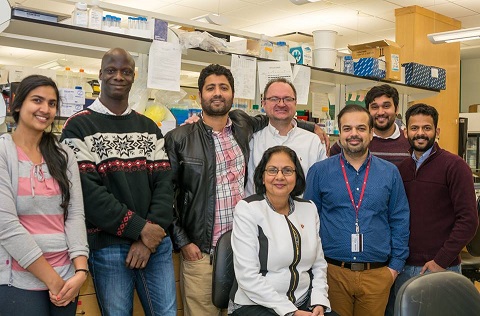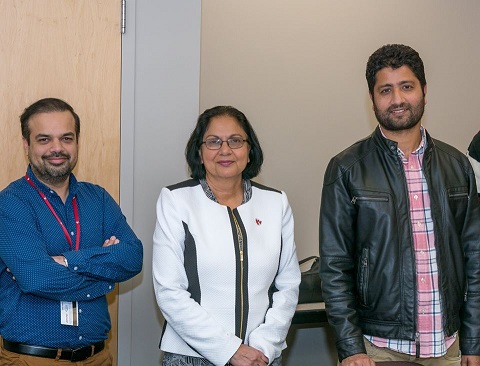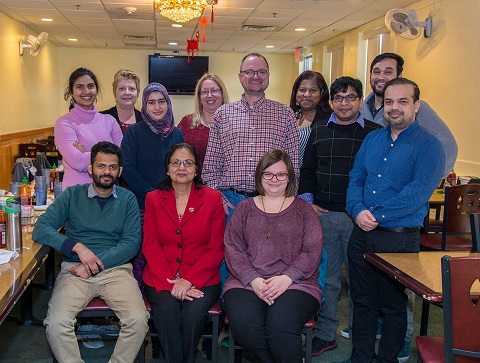 |
Name: Vimla Band, Ph. D. Rank: Professor and Chairwoman Department: Genetics, Cell Biology and Anatomy Phone: 402-559-8565 Email: vband@unmc.edu |
Research Interests
Breast cancer remains the second leading cause of cancer-related deaths among US women. Recent studies have established that breast cancer is not a single disease but rather a group of diseases, with at least three major subtypes of basal, luminal and ErbB2-positive cancers. The subtype of breast cancer determines the disease-free and overall survival among breast cancer patients. Thus, understanding the origin of various subtypes of breast cancers is directly linked to the therapeutic choices, and outcomes of disease. Our laboratory is focused on defining i) origin of breast cancer subtypes from progenitor/stem cells; ii) Identification of novel cellular proteins that determine breast cancer prognosis and patient survival, such as Ecdysoneless (ECD) and Alteration/Deficiency in Activation (ADA3). We identified these two novel proteins as major regulators of cell cycle progression and oncogenesis. Current focus of the laboratory is to define mechanisms and clinical relevance of these proteins and the associated complexes in breast and other solid cancers using cell biological, molecular biology, biochemistry, animal models and patients’ specimens.

Lab members

Several lab members

Recent Research Highlights
- We have demonstrated a novel role of mammalian Ecdysoneless in cell cycle regulation.
- We have demonstrated that Ecdysoneless is overexpressed in breast cancers and overexpression of Ecdysoneless serves as a marker of poor prognosis in HER2/neu-overexpressing breast cancer patients.
- We have generated the first telomerase-immortalized human mammary stem/progenitor cells that maintain their ability to self renew and differentiate.
- We have demonstrated that ectopically-expressed oncogenes induce block in lineage specific differentiation of immortal human mammary stem / progenitor cells.
Lab Members
Vimla Band – Professor and Chair
Aditya Bele – Graduate Student
Divya Bhagirath – Graduate Student
Fnu Gayatri – Post Doc
Bryan Katafiasz – Research Technologist
Riyaz Mir – Post Doc
Sameer Mirza – Post Doc
Shakur Mohibi – Graduate Student
Shashank Srivastava – Graduate Student
June Wang - Instructor
Xiangshan Zhao – Assistant Professor
Taylor Ziegler - INBRE summer student
Selected Publications:
- Olou AA, Bele A, Sarkar A, Gurumurthy CB, Mir RA, Ammons SA, Mirza S, Saleem I, Urano F, Band H and Band V. Mammalian ECD protein is a novel negative regulator of the PERK arm of unfolded protein response. Mol. Cell. Biol. In Press 2017.
- Srivastava S, Mohibi S, Mirza S, Band H and Band V. Epidermal Growth Factor Induces ADA3 Acetylation through AKT-p300 Pathway. Cell Cycle, In Press. 2017
- Bhagirath D, Zhao X, Mirza S, West WW, Band H, Band V.Mutant PIK3CA Induces EMT in a Cell Type Specific Manner. PLoS One. 2016 Dec 12;11(12):e0167064. doi: 10.1371/journal.pone.0167064.
- Griffin NI, Sharma G, Zhao X, Mirza S, Srivastava S, Dave BJ, Aleskandarany M, Rakha E, Mohibi S, Band H, Band V. ADA3 regulates normal and tumor mammary epithelial cell proliferation through c-MYC. Breast Cancer Res. 2016 Nov 16;18(1):113.
- Mohibi S, Srivastava S, Bele A, Mirza S, Band H, Band V.Acetylation of Mammalian ADA3 Is Required for Its Functional Roles in Histone Acetylation and Cell Proliferation. Mol Cell Biol. 2016 Sep 12;36(19):2487-502.
- Mir RA, Bele A, Mirza S, Srivastava S, Olou AA, Ammons SA, Kim JH, Gurumurthy CB, Qiu F, Band H, Band V.A Novel Interaction of Ecdysoneless (ECD) Protein with R2TP Complex Component RUVBL1 Is Required for the Functional Role of ECD in Cell Cycle Progression. Mol Cell Biol. 2015 Dec 28;36(6):886-99.
- Mohibi S, Srivastava S, Wang-France J, Mirza S, Zhao X, Band H, Band V. Alteration/Deficiency in Activation 3 (ADA3) Protein, a Cell Cycle Regulator, Associates with the Centromere through CENP-B and Regulates Chromosome Segregation. J Biol Chem. 2015 Nov 20;290(47):28299-310. doi: 10.1074/jbc.M115.685511.
- Bhagirath D, Zhao X, West WW, Qiu F, Band H, Band V. Cell type of origin as well as genetic alterations contribute to breast cancer phenotypes. Oncotarget 2015 Apr 20;6(11):9018-30.
Pubmed Citations for Band V ( PubMed )

